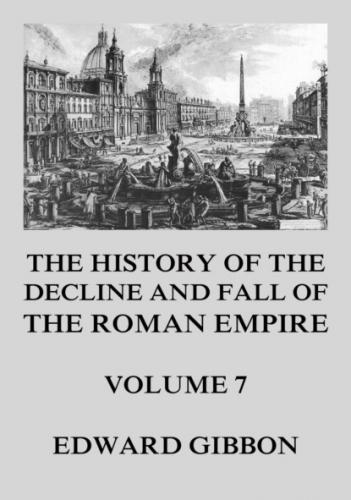IV. The subjects of Justinian were dissatisfied with the times, and with the government. Europe was over-run by the Barbarians, and Asia by the monks; the poverty of the West discouraged the trade and manufactures of the East; the produce of labour was consumed by the unprofitable servants of the church, the state, and the army; and a rapid decrease was felt in the fixed and circulating capitals which constitute the national wealth. The public distress had been alleviated by the economy of Anastasius, and that prudent emperor accumulated an immense treasure while he delivered his people from the most odious or oppressive taxes. Their gratitude universally applauded the abolition of the gold of affliction, a personal tribute on the industry of the poor, Ref. 081 but more intolerable, as it should seem, in the form than in the substance, since the flourishing city of Edessa paid only one hundred and forty pounds of gold, which was collected in four years from ten thousand artificers. Ref. 082 Yet such was the parsimony which supported this liberal disposition that, in a reign of twenty-seven years, Anastasius saved, from his annual revenue, the enormous sum of thirteen millions sterling, or three hundred and twenty thousand pounds of gold. Ref. 083 His example was neglected, and his treasure was abused, by the nephew of Justin. The riches of Justinian were speedily exhausted by alms and buildings, by ambitious wars, and ignominious treaties. His revenues were found inadequate to his expenses. Every art was tried to extort from the people the gold and silver which he scattered with a lavish hand from Persia to France; Ref. 084 his reign was marked by the vicissitudes, or rather by the combat, of rapaciousness and avarice, of splendour and poverty; he lived with the reputation of hidden treasures, Ref. 085 and bequeathed to his successor the payment of his debts. Ref. 086 Such a character has been justly accused by the voice of the people and of posterity; but public discontent is credulous; private malice is bold; and a lover of truth will peruse with a suspicious eye the instructive anecdotes of Procopius. The secret historian represents only the vices of Justinian, and those vices are darkened by his malevolent pencil. Ambiguous actions are imputed to the worst motives; error is confounded with guilt, accident with design, and laws with abuses; the partial injustice of a moment is dexterously applied as the general maxim of a reign of thirty-two years; the emperor alone is made responsible for the faults of his officers, the disorders of the times, and the corruption of his subjects; and even the calamities of nature, plagues, earthquakes, and inundations are imputed to the prince of the demons, who had mischievously assumed the form of Justinian. Ref. 087
After this precaution I shall briefly relate the anecdotes of avarice and rapine, under the following heads: I. Justinian was so profuse that he could not be liberal. The civil and military officers, when they were admitted into the service of the palace, obtained an humble rank and a moderate stipend; they ascended by seniority to a station of affluence and repose; the annual pensions, of which the most honourable class was abolished by Justinian, amounted to four hundred thousand pounds; and this domestic economy was deplored by the venal or indigent courtiers as the last outrage on the majesty of the empire. The posts, the salaries of physicians, and the nocturnal illuminations were objects of more general concern; and the cities might justly complain that he usurped the municipal revenues which had been appropriated to these useful institutions. Even the soldiers were injured; and such was the decay of military spirit that they were injured with impunity. The emperor refused, at the return of each fifth year, the customary donative of five pieces of gold, reduced his veterans to beg their bread, and suffered unpaid armies to melt away in the wars of Italy and Persia. II. The humanity of his predecessors had always remitted, in some auspicious circumstance of their reign, the arrears of the public tribute; and they dexterously assumed the merit of resigning those claims which it was impracticable to enforce. “Justinian in the space of thirty-two years has never granted a similar indulgence; and many of his subjects have renounced the possession of those lands whose value is insufficient to satisfy the demands of the treasury. To the cities which had suffered by hostile inroads, Anastasius promised a general exemption of seven years: the provinces of Justinian have been ravaged by the Persians and Arabs, the Huns and Sclavonians; but his vain and ridiculous dispensations of a single year have been confined to those places which were actually taken by the enemy.” Such is the language of the secret historian, who expressly denies that any indulgence was granted to Palestine after the revolt of the Samaritans: a false and odious charge, confuted by the authentic record, which attests a relief of thirteen centenaries of gold (fifty-two thousand pounds) obtained for that desolate province by the intercession of St. Sabas. Ref. 088 III. Procopius has not condescended to explain the system of taxation, which fell like a hail-storm upon the land, like a devouring pestilence on its inhabitants; but we should become the accomplices of his malignity, if we imputed to Justinian alone the ancient though rigorous principle that a whole district should be condemned to sustain the partial loss of the persons or property of individuals. The Annona, or supply of corn for the use of the army and capital, was a grievous and arbitrary exaction, which exceeded, perhaps in a tenfold proportion, the ability of the farmer; and his distress was aggravated by the partial injustice
